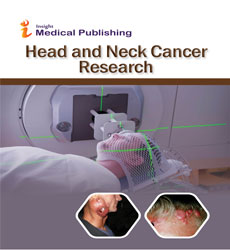The Nasopharyngeal cancer with Head and Neck Cancer Diagnosis
Sebastien Lowenstein*
Department of Radiotherpahy, University of Houston, Texas, USA
- *Corresponding Author:
- Sebastien Lowenstein,
Department of Radiotherpahy, University of Houston, Texas, USA, Email: seblowenstein@uh.edu
Received Date: October 13, 2021; Accepted Date: October 27, 2021; Published Date: November 04, 2021
Citation: Sebastien Lowenstein (2021) Nasopharyngeal cancer with Head and Neck Cancer Diagnosis. Head Neck Cancer Res. Vol.6 No.5. 39
Introduction
Nasopharyngeal cancer is an uncommon kind of head and neck cancer. It begins in the upper piece of your throat and behind the nose. This are is also known as the nasopharynx. The nasopharynx is positioned at the base of the skull, above the roof of mouth. The human breathe air, flows through the nose into the throat and nasopharynx then travels into Lungs.
Researchers haven’t yet found the exact reason for nasopharyngeal cancer. But the researchers believe that the cancer is linked to Epstein-Barr virus (EBV). In the U.S., the vast majority who have had an EBV disease never have long-term problems. Researchers are as yet exploring how EBV prompts nasopharyngeal cancer, however it might be identified with genetic material (DNA) from the virus influencing the DNA cells of the nasopharynx. The change of DNA makes cells to develop and grow abnormally which causing cancer. The NPC goes up if we eat food rich salt- cured fish and meat. Tobacco and liquor may likewise cause a reason for cancer in human body; however the scientists haven’t found a direct link to growth of NPC. But few believe that the chemical used in Tobacco leads to cancer.
Nasopharyngeal Cancer Is Diagnosed
Based on symptoms, medical history, family history doctors will perform few physical exams by taking a glance at your ears, nose, and throat. Most patients have a lump in the neck as symptoms of nasopharyngeal cancer and also this is an indication that the cancer is spreading to the lymph hubs. A process called nasopharyngoscopy is performed by the doctors where the examiner will send a flexible, lighted tube into the patient’s mouth and nose to view the nasopharynx for abnormal growths, bleeding or any other problems. If the test is unusual, your primary care physician might suggest a biopsy. A biopsy is the removal of a small amount of tissue for examination under a microscope.
Nasopharyngeal Cancer Treatment
When diagnosed with nasopharyngeal cancer regular follow-ups of medical treatment should be done.
The treatment varies according to tumour location, stage of tumour and overall health
The treatment can be of different types like:
Radiation Therapy
Radiation therapy is used a treatment to cure early stage of nasopharyngeal cancer. X-rays are used to kill cancer cells and stop them from growing in Radiation Therapy. In one type of radiation therapy IMRT deliver High-dose radiation directly in the cancer cell to minimize damage to the nearby tissues. But this may cause few side effects and complications than conventional radiation treatment. Those complications are
• dry mouth
• inflammation of the lining of your mouth and throat
• blindness
• brain stem injury
• death of healthy tissue
• tooth decay
Chemotherapy
Chemotherapy means using drugs to kill cancer cells. Compared to chemotherapy radiation therapy held much results in case of treating nasopharyngeal cancer. One advantage of using chemotherapy as a treatment is that the patient might have a chance to live longer even though diagnosed with cancer.
Surgery
Surgery to remove the tumor is not often performed because of the tumor's location near nerves and blood vessels. It may cause permanent damage to the eye and other nearby structures.
Not all people with nasopharyngeal cancer can have surgery. Your doctor will consider the location and stage of your tumor when discussing your treatment options.
Biologic drugs
Biologic drugs affect how your body's immune system fights disease. They include monoclonal antibodies such as cetuximab (Erbitux), pembrolizumab (Keytruda), and nivolumab (Opdivo). Biologics work differently than chemotherapy drugs and may be used more often in cases of advanced or recurrent cancer.
Palliative therapy
Palliative therapy is a treatment given to relieve the symptoms and reduce the suffering caused by cancer and other life-threatening diseases. Palliative cancer therapies are given together with other cancer treatments, from the time of diagnosis, through treatment, survivorship, recurrent or advanced disease, and at the end of life.
Clinical trials
If any of the treatment for curing nasopharyngeal cancer does not work then please consider clinical trials. Researchers regularly find new way of treating cancer.
Open Access Journals
- Aquaculture & Veterinary Science
- Chemistry & Chemical Sciences
- Clinical Sciences
- Engineering
- General Science
- Genetics & Molecular Biology
- Health Care & Nursing
- Immunology & Microbiology
- Materials Science
- Mathematics & Physics
- Medical Sciences
- Neurology & Psychiatry
- Oncology & Cancer Science
- Pharmaceutical Sciences
